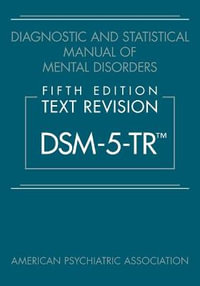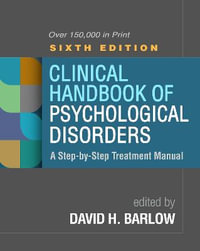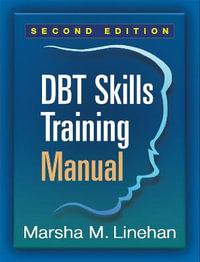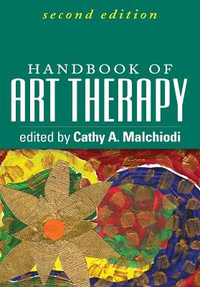
Psychodynamic Psychopharmacology
Caring for the Treatment-Resistant Patient
By: David Mintz
Paperback | 24 January 2022
At a Glance
295 Pages
22.81 x 15.19 x 1.6
Paperback
RRP $150.00
$121.25
19%OFF
or 4 interest-free payments of $30.31 with
orAims to ship in 5 to 10 business days
Psychodynamic Psychopharmacology illuminates a new path forward. It examines the psychological and interpersonal mechanisms of pharmacological treatment resistance, integrating research on evidence-based prescribing processes with psychodynamic insights and skills to enhance treatment outcomes for patients who are difficult to treat.
The first part of the book explores the evidence base that guides how, rather than simply what, to prescribe. It describes precisely what psychodynamic psychopharmacology is and why its emphasis on combining the often-neglected psychosocial aspects of medication with biomedical considerations provides a more optimized approach to addressing treatment resistance.
Part II delves into the psychodynamics that contribute to pharmacological treatment resistance, both when patients ambivalence about their illness, the medication itself, or their prescriber manifests in nonadherence and when medications support a negative identity or are used as replacements for healthy capacities. Readers will gain basic skills for addressing the psychological and interpersonal dynamics that underpin both scenarios and will be better positioned to ameliorate interferences with the healthy use of medications.
The final section of the book offers detailed technical recommendations for addressing pharmacological treatment resistance. It tackles issues that include countertransference-driven irrational prescribing; primitive dynamics, such as splitting and projective identification; and the overlap between psychopharmacological treatment resistance and the dynamics of treatment nonadherence and nonresponse in integrated and collaborative medical care settings.
By putting the individual patient back at the center of the therapeutic equation, psychodynamic psychopharmacology, as outlined in this book, offers a model that moves beyond compliance and emphasizes instead the alliance between patient and prescriber. In doing so, it empowers patients to become more active contributors in their own recovery.
About the Author
Dr. David Mintz has done a great service in this excellent book for those who prescribe psychiatric medications: he has provided an important approach to optimizing treatment outcomes by integrating pharmacotherapy with a psychodynamically-informed perspective that enhances therapeutic factors for the patient and in the doctor-patient encounter. Through clinical examples and literature review he has defined what many clinicians have learned through experience but were not taught as part of their psychopharmacology education.
The interpersonal context of the prescribing relationship between prescriber and patient may have deep psychodynamic meaning to many patients. Understanding these factors (such as transference to parental figures) can enhance the adherence and effectiveness of treatments. I recommend this book for all psychopharmacology prescribers. - Carl Salzman M.D., Professor of Psychiatry Harvard Medical School
Industry Reviews
This book is the first of its kind in providing a comprehensive review of psychodynamic psychopharmacology. While a few book chapters or editorials have been powerful, this book offers a potent mix of research reviews, clinical examples, vignettes, practical tips, and effective use of tables and graphs. The author articulates the impact of the therapeutic relationship on psychopharmacologic interventions and how to manage common clinical pitfalls.
-- Daniel M Tuinstra, MD * Doody *David Mintz's book on psychodynamic psychopharmacology invites us to consider how rather than what to prescribe. Echoing Balint, he reminds us that the pharmacotherapeutic alliance and the manner in which the doctor interacts with the patient are instrumental to outcomes. He educates us on factors that affect treatment, such as patient characteristics (attachment style, placebo, treatment preference) and prescriber characteristics (warmth, promoting autonomy, supporting decision-making).The book is well structured, starting with defining psychodynamic psychopharmacology and its large evidence base. It provides a framework for considering treatment resistance at the level of meaning and subsequently breaks down the overarching principles of psychodynamic psychopharmacology. It is suffused with case formulations and transcripts of conversations with patients. We meet a patient whose psychosis was protecting them against the depressing reality of an earlier loss; the prescriber took this into account when deciding to prescribe less aggressively and to allow for grieving to take place. Examples of patients using their medication in countertherapeutic ways or being unhealthily attached to their tablets made me consider my own practice. Prescribing in a truly integrated way can feel like a novelty and sometimes lonely in a predominantly biological psychiatric paradigm. You are not alone. Mintz guides you with a manual on how to approach the engagement and maintenance phase of prescribing. There is a self-assessment toolkit and a glossary, all invaluable tools for clinical practice and teaching purposes.
This book does not antagonise but it complements the science
of psychopharmacology. It should be in the curriculum of psychiatric if not medical training. It is likely to restore faith in psychiatry as a profession and in our roles as doctors of the mind and
the body.
- Preface
-
Part 1. What Is Psychodynamic Psychopharmacology?
- Chapter 1. What Is Psychodynamic Psychopharmacology?
- Chapter 2. Why Psychodynamic Psychopharmacology?
- Chapter 3. What Is Psychodynamic About Psychodynamic Psychopharmacology?
-
Part 2. Understanding Pharmacological Treatment Resistance
- Chapter 4. Psychodynamics of Pharmacological Treatment Resistance
- Chapter 5. Treatment Resistance to Medications
- Chapter 6. Treatment Resistance From Medications
- Chapter 7. The Prescribers Contribution to Treatment Resistance
-
Part 3. The Manual of Psychodynamic Psychopharmacology
- Chapter 8. Avoid a Mind-Body Split
- Chapter 9. Know Who the Patient Is
- Chapter 10. Attend to Patients Ambivalence
- Chapter 11. Cultivate the Pharmacotherapeutic Alliance
- Chapter 12. Attend to Countertherapeutic Uses of Medications
- Chapter 13. Identify, Contain, and Use Countertransference
- Chapter 14. Who Is Psychodynamic Psychopharmacology For? Patient Characteristics
- Chapter 15. Before Initiating Treatment
- Chapter 16. The Engagement Phase
- Chapter 17. The Maintenance Phase
- Chapter 18. Split and Combined Treatments
- Chapter 19. Psychodynamic Psychopharmacology and Integrated Care
- Appendix 1. Psychodynamic Psychopharmacology Self-Assessment Checklist
- Appendix 2. Glossary of Psychodynamic Concepts Relevant to the Practice of Pharmacotherapy
- Index
ISBN: 9781615371525
ISBN-10: 1615371524
Published: 24th January 2022
Format: Paperback
Language: English
Number of Pages: 295
Audience: Professional and Scholarly
Publisher: AMERICAN PSYCHIATRIC ASSOCIATION PUBLISHING
Country of Publication: US
Dimensions (cm): 22.81 x 15.19 x 1.6
Weight (kg): 0.41
Shipping
| Standard Shipping | Express Shipping | |
|---|---|---|
| Metro postcodes: | $9.99 | $14.95 |
| Regional postcodes: | $9.99 | $14.95 |
| Rural postcodes: | $9.99 | $14.95 |
How to return your order
At Booktopia, we offer hassle-free returns in accordance with our returns policy. If you wish to return an item, please get in touch with Booktopia Customer Care.
Additional postage charges may be applicable.
Defective items
If there is a problem with any of the items received for your order then the Booktopia Customer Care team is ready to assist you.
For more info please visit our Help Centre.
You Can Find This Book In
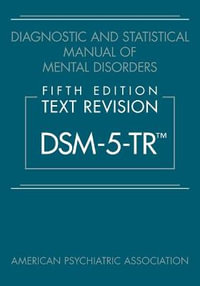
Diagnostic and Statistical Manual of Mental Disorders 5/e TR (DSM-5-TR)
Diagnostic and Statistical Manual of Mental Disorders
Hardcover
RRP $347.00
$306.90
OFF
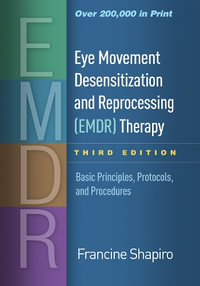
Eye Movement Desensitization and Reprocessing (EMDR) Therapy
Basic Principles, Protocols, and Procedures 3rd Edition
Hardcover
RRP $161.00
$138.25
OFF

